Are you tired of dealing with pests in your home? Discover the world of eco-friendly pest control and find out how you can effectively eliminate pests while minimizing harm to the environment. In this article, we will explore the basics of eco-friendly pest control, including its benefits and common techniques. Learn how eco-friendly pest control differs from traditional methods and gain a deeper understanding of its environmental impact. With our tips for implementing eco-friendly pest control in your home, you can create a healthier living space for yourself and your family.
The Basics of Eco Friendly Pest Control
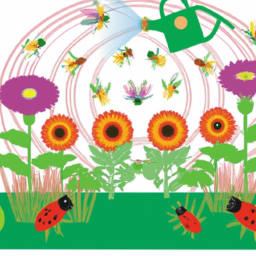
The basics of eco friendly pest control involve using natural methods instead of harmful chemicals. When it comes to dealing with pests in an environmentally friendly way, there are various eco friendly pest control products and techniques available for you to utilize.
One effective technique is the use of biological controls. This involves introducing natural predators or parasites that target specific pests. For instance, ladybugs can be released to combat aphids in your garden. Another technique is crop rotation, which helps prevent the buildup of pests by disrupting their breeding cycles.
Additionally, you can use traps and barriers as part of your eco friendly pest control approach. Sticky traps can catch flying insects like fruit flies without using any harmful chemicals. Physical barriers like nets or fences can also keep pests away from your plants without causing harm to them or the environment.
Furthermore, organic insecticides made from natural ingredients such as neem oil or pyrethrum extract are great alternatives to chemical pesticides. These products are derived from plants and break down quickly in the environment, minimizing their impact on non-target organisms.
Benefits of Using Eco Friendly Pest Control Methods
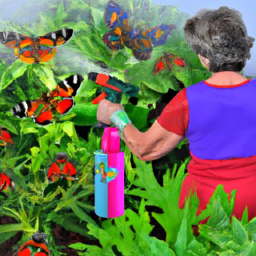
Using environmentally conscious methods for pest management comes with a variety of advantages. When it comes to eco-friendly pest control, the benefits are numerous and the importance cannot be overstated.
One of the key benefits of using eco-friendly pest control methods is that they are safe for both humans and pets. Traditional pest control methods often involve the use of harmful chemicals that can pose health risks to you and your loved ones. Eco-friendly alternatives, on the other hand, utilize natural ingredients that are non-toxic and do not harm the environment.
Another benefit is that eco-friendly pest control methods target pests specifically, without harming beneficial insects or pollinators. This is important because bees, butterflies, and other pollinators play a crucial role in our ecosystem by helping plants reproduce. By opting for eco-friendly solutions, you can effectively manage pests while preserving these valuable species.
Additionally, using eco-friendly pest control methods helps to reduce environmental pollution. Traditional pesticides can contaminate soil, water sources, and air quality. In contrast, eco-friendly alternatives minimize this risk by relying on natural substances that break down more easily in nature.
Common Eco Friendly Pest Control Techniques
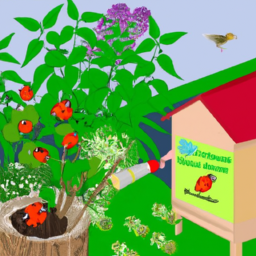
When it comes to managing pests in an environmentally conscious way, you’ll find several common techniques that are safe and effective. Alternative pest control methods have gained popularity due to the harmful effects of traditional chemical-based pesticides on the environment and human health. Eco-friendly pest deterrents offer a sustainable solution that targets pests without causing harm to other organisms or polluting the ecosystem.
One popular eco-friendly method is biological control, which involves introducing natural predators or parasites to control pest populations. This technique harnesses the power of nature by using beneficial insects like ladybugs or nematodes to combat pests such as aphids or grubs. Another approach is integrated pest management (IPM), which combines various strategies such as habitat modification, crop rotation, and mechanical barriers to minimize pesticide use while keeping pests under control.
Organic pesticides derived from botanical sources like neem oil or pyrethrum are also commonly used in eco-friendly pest control. These substances are extracted from plants and pose fewer risks to human health and the environment compared to synthetic chemicals. Additionally, physical methods like trapping, baiting, and exclusion can be employed to prevent pests from entering buildings or damaging crops.
How Eco Friendly Pest Control Differs From Traditional Methods
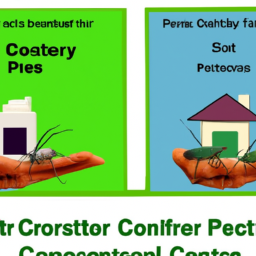
To effectively manage pests in an environmentally conscious way, you should consider how eco-friendly pest control methods differ from traditional techniques. When comparing the effectiveness of eco-friendly pest control methods to traditional ones, it is important to note that both approaches aim to eliminate pests. However, eco-friendly methods prioritize the use of natural and non-toxic substances, while traditional methods often rely on chemicals that can be harmful to humans and the environment.
One key difference between these two approaches is their impact on non-target organisms. Eco-friendly pest control methods are designed to specifically target pests without harming beneficial insects, birds, or animals. Traditional methods, on the other hand, can have unintended consequences by killing off beneficial species along with the targeted pests.
Another aspect to consider is cost-effectiveness. While some people assume that eco-friendly pest control methods may be more expensive than traditional ones, this is not always the case. In fact, over time, eco-friendly methods can prove to be more cost-effective due to their focus on prevention and long-term solutions rather than short-term fixes.
Understanding the Environmental Impact of Pest Control
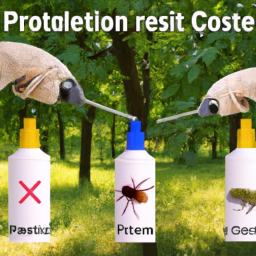
Understanding the environmental impact of pest control is essential for making informed decisions about managing pests in an environmentally conscious manner. When it comes to traditional pest control methods, there are often negative consequences for the environment. Pesticides and chemical treatments can contaminate soil, water sources, and harm beneficial insects like bees and butterflies. These practices can also have long-term effects on human health.
However, there are eco-friendly alternatives that provide effective pest control while minimizing harm to the environment. One of these alternatives is integrated pest management (IPM), which focuses on using a combination of techniques such as biological controls, habitat manipulation, and cultural practices to manage pests. By implementing IPM strategies, you can reduce reliance on pesticides and promote natural pest control methods.
Another eco-friendly option is the use of organic or natural products that are derived from plant extracts or other non-toxic substances. These products target specific pests without harming beneficial organisms or leaving harmful residues in the environment.
By choosing eco-friendly alternatives for pest control, you can reap several environmental benefits. You contribute to preserving biodiversity by protecting beneficial insects and wildlife. Additionally, you help maintain a healthy ecosystem by promoting natural balances between pests and their predators.
Key Features of Eco Friendly Pest Control Products
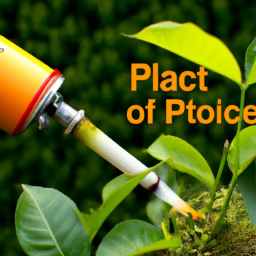
Using natural ingredients derived from plants or non-toxic substances, these products offer effective pest management while minimizing harm to the environment. Eco friendly pest control methods for gardens and eco friendly pest control solutions for commercial spaces are becoming increasingly popular due to their numerous benefits. These products work by targeting pests while being safe for humans, pets, and beneficial insects.
In gardens, eco friendly pest control methods involve using natural repellents such as neem oil or garlic spray to deter pests without harming the plants or soil. Additionally, introducing beneficial insects like ladybugs or praying mantises can help control pest populations naturally. Organic pesticides made from plant extracts can also be used as a last resort when necessary.
For commercial spaces, eco friendly pest control solutions focus on integrated pest management (IPM) techniques. This involves a combination of preventative measures like sealing entry points and removing food sources, along with targeted treatments using botanical-based insecticides or traps. By implementing IPM strategies, businesses can effectively manage pests while reducing reliance on harmful chemicals.
Overall, eco friendly pest control products provide an environmentally conscious alternative to traditional pesticide use. They promote sustainable practices and protect ecosystems without compromising effectiveness in managing pests. Whether in your garden or commercial space, choosing eco friendly options ensures a safer and healthier environment for everyone involved.
Tips for Implementing Eco Friendly Pest Control in Your Home
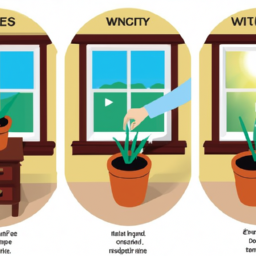
When implementing eco-friendly pest control in your home, it’s important to seal any entry points where pests can enter. By doing so, you are creating a barrier that prevents unwanted pests from infiltrating your living space. To achieve this, start by inspecting the exterior of your home for cracks and gaps in walls, windows, doors, and foundation. Use caulk or weatherstripping to seal these openings effectively.
Another tip for implementing eco-friendly pest control is to keep your home clean and free of food debris. Pests are attracted to food sources, so make sure to store all food items properly in sealed containers. Regularly clean up spills and crumbs, especially in kitchen areas.
In addition to sealing entry points and maintaining cleanliness, consider using eco-friendly pest control products and techniques. These products are designed to target pests while minimizing harm to the environment and human health. Look for natural alternatives such as botanical-based insecticides or biological controls like nematodes or predatory insects.
Furthermore, implementing eco-friendly techniques like integrated pest management (IPM) can be highly effective. IPM involves a combination of preventive measures such as sanitation practices, physical barriers, and targeted applications of pesticides only when necessary.
The Role of Integrated Pest Management in Eco Friendly Pest Control
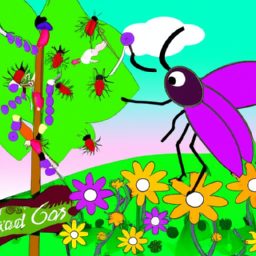
Now that you have learned some tips for implementing eco friendly pest control in your home, let’s delve into the role of integrated pest management (IPM) in this approach. IPM is a systematic and comprehensive strategy that focuses on long-term prevention and management of pests while minimizing the use of harmful chemicals.
Integrated pest management techniques involve a combination of practices such as regular inspections, monitoring, habitat modification, biological controls, and targeted pesticide applications. By integrating these methods, you can effectively reduce pest populations without causing harm to the environment or human health.
To ensure that eco friendly pest control practices are implemented correctly, it is important to look for certifications from reputable organizations. These certifications demonstrate that the company or individual has undergone training and follows strict guidelines to provide environmentally responsible solutions for pest control.
Some examples of eco friendly pest control certifications include those from EcoWise Certified Pest Management Professionals and GreenPro certified technicians. These certifications indicate that the professionals have a deep understanding of integrated pest management strategies and are committed to using less toxic pesticides whenever possible.
Exploring Natural Remedies for Pest Control
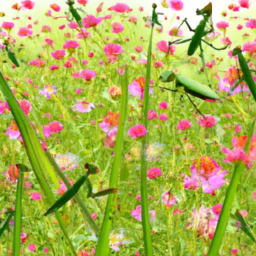
To effectively manage pests without harm to the environment or human health, it’s important to explore natural remedies. Natural pest repellents offer a safe and eco-friendly alternative to conventional chemical-based pesticides. These homemade pest control solutions can be just as effective in deterring pests while minimizing the negative impact on our surroundings.
One popular natural pest repellent is a mixture of vinegar and water. The strong odor of vinegar repels insects like ants, spiders, and even mosquitoes. Simply mix equal parts white vinegar and water in a spray bottle and apply it around windows, doors, and other areas where pests may enter.
Another effective homemade pest control solution is using essential oils. Essential oils such as peppermint, tea tree oil, and eucalyptus have natural insect-repellent properties. Mix a few drops of these oils with water in a spray bottle and use it to create a barrier against pests.
Additionally, planting certain herbs and flowers can help deter pests naturally. For example, marigolds are known for repelling aphids, nematodes, and other garden pests. Basil plants can keep flies away from your home.
Eco Friendly Pest Control: A Sustainable Solution for a Healthy Home
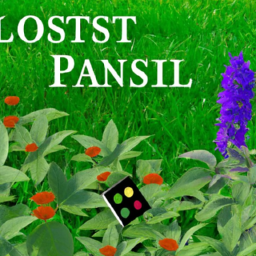
You can achieve a sustainable and healthy home by adopting the practice of using environmentally conscious methods to manage pests. By opting for eco-friendly alternatives, you not only protect your living space but also contribute to a greener planet.
One of the most effective sustainable alternatives for pest control is integrated pest management (IPM). This approach focuses on prevention rather than relying solely on chemicals. It involves identifying the root cause of pest infestations and implementing strategies like sealing cracks and crevices, removing food sources, and maintaining cleanliness. Additionally, natural remedies such as essential oils, vinegar solutions, and diatomaceous earth can be used to repel or eliminate pests.
Another eco-friendly option is biological control. This method involves introducing natural predators or parasites that feed on specific pests into the environment. For example, ladybugs are beneficial insects that can help control aphids in your garden.
Furthermore, utilizing physical barriers like screens on windows and doors or installing mesh around gardens can prevent pests from entering your home or damaging plants.
Frequently Asked Questions
Are Eco Friendly Pest Control Methods More Expensive Than Traditional Methods?
Are eco friendly pest control methods more expensive than traditional methods? When it comes to cost comparison, you might be surprised to learn that eco friendly pest control can actually be quite affordable. While the initial investment may be slightly higher, in the long run, it can save you money by preventing future infestations and damage. Additionally, these methods have numerous environmental benefits. They use natural ingredients and minimize the use of harmful chemicals, reducing pollution and protecting our ecosystem.
Can Eco Friendly Pest Control Methods Be as Effective as Traditional Methods?
Eco friendly pest control methods can indeed be as effective as traditional methods. When comparing effectiveness, it is important to consider various factors such as the type of pest being targeted and the specific method used. While traditional methods may have been more commonly used in the past, eco friendly alternatives have made significant advancements. They utilize natural ingredients and innovative techniques to effectively eliminate pests while minimizing their environmental impact. So, when it comes to effectiveness comparison and considering environmental concerns, eco friendly pest control can be a great alternative.
How Long Does It Take for Eco Friendly Pest Control Methods to Show Results?
When it comes to eco friendly pest control methods, you might be wondering how long it takes to see results. The timeframe can vary depending on the specific method used and the severity of the pest infestation. In general, eco friendly methods can take some time to fully eradicate pests from your home. However, by choosing the right method for your situation and addressing any common misconceptions about eco friendly pest control, you can achieve effective and long-lasting results in a safe and environmentally-friendly way.
Are Eco Friendly Pest Control Products Safe for Children and Pets?
Eco friendly pest control products are safe for children and pets. This is one of the key benefits of using them. Many people have misconceptions that eco friendly products are not as effective as traditional pesticides. However, this is not true. Eco friendly pest control methods utilize natural ingredients that are just as effective in eliminating pests, but without the harmful chemicals that can pose a risk to children and pets. You can rest assured knowing that your loved ones will be safe while effectively controlling pests.
Can I Implement Eco Friendly Pest Control Methods on My Own, or Do I Need to Hire a Professional?
You may be wondering if you can implement DIY eco friendly pest control methods or if you need to hire a professional. While it is possible to tackle some pest control tasks on your own, hiring a professional has its benefits. Professionals have the knowledge and expertise to properly identify pests, determine the most effective eco friendly solutions, and safely apply them. Additionally, they can provide ongoing monitoring and maintenance to ensure long-term pest prevention.
Conclusion
In conclusion, eco friendly pest control offers a sustainable and effective solution for maintaining a healthy home environment. By utilizing techniques such as integrated pest management and natural remedies, you can successfully manage pests without causing harm to the environment or compromising your health. The benefits of using eco friendly pest control methods are numerous, including reduced chemical exposure, protection of beneficial insects, and long-term pest prevention. So why not make the switch today and enjoy a pest-free home that is safe for both you and the planet?